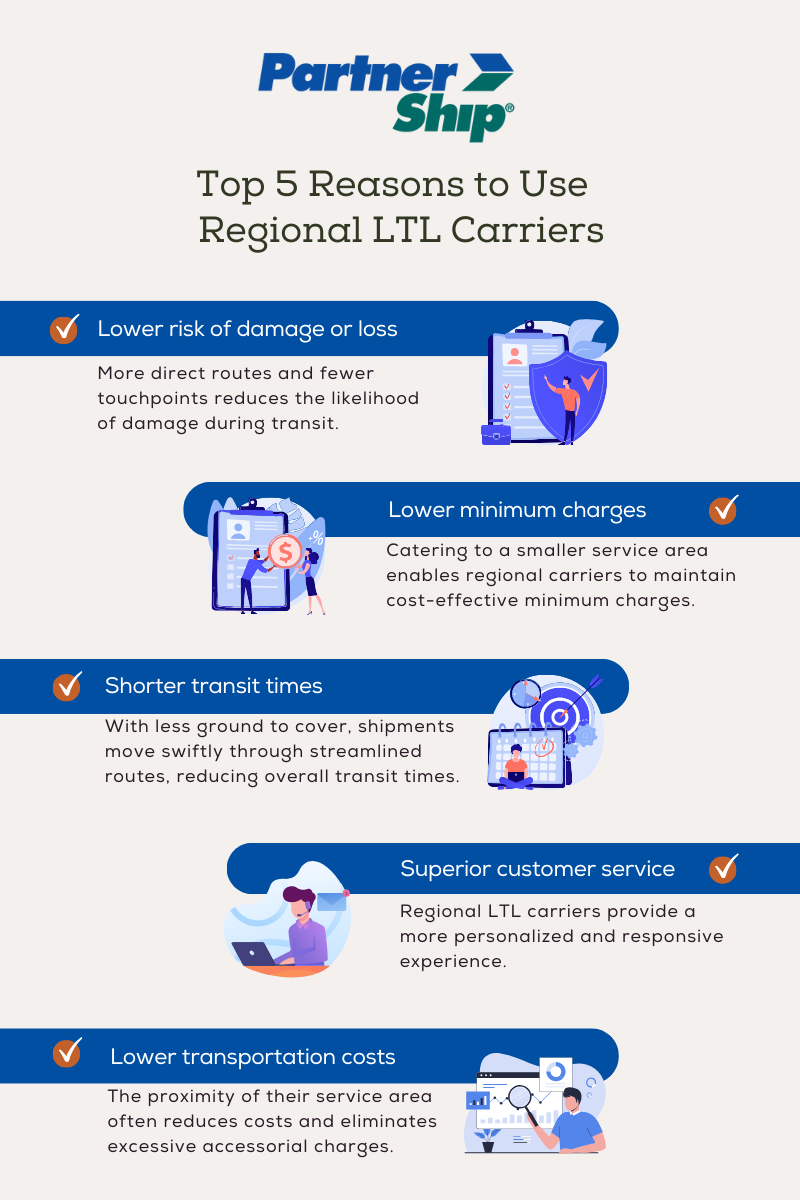the PartnerShip Connection blog
the PartnerShip Connection blog
the PartnerShip Connection blog
the PartnerShip Connection blog
the PartnerShip Connection blog
-
Freight Quote vs. Invoice: Why Don’t They Match?
05/05/2025 — Jen Deming

One of the most common questions we get is from customers wondering why the heck their final freight invoice doesn’t match the rate they were originally quoted. It’s a valid concern because once you have that bill, it’s next to impossible to get more money from your customer and you’re going to be eating that cost. Your knee-jerk reaction may be to blame the carrier, but the real reason they are different may sting a bit – it’s usually a shipper error. Before you start pointing fingers, review these common reasons your bill doesn’t match that original quote.
Reason 1: Your product is classed incorrectly
One of the most common reasons a quote differs from a final bill is because your product is classed incorrectly. With classification being a huge factor affecting your freight quote, even a small error can impact your price. If you guess or miscalculate, your class may be way off.
The issue may be that sometimes your product is difficult to fit in a particular NMFC category. Take glass jars for example. This type of product falls under NMFC code 87700. It’s not as simple as that, however. Because glass jars are typically fragile, they are broken down by volume, and depending on that calculation, the class can be anywhere from class 65 to 400. In an average freight shipment, that’s a difference of hundreds of dollars. Make sure you are utilizing ClassIT, and consulting freight experts if you have any questions on class, or how to properly calculate density.
Reason 2: A liftgate service inflated your bill
When checking your freight quote vs. invoice, unexpected extra services are the second most common reason for a mismatch. One example we see time after time is for liftgate service. If you didn’t specify you would need a liftgate when you got your quote, but then your carrier provides the service at pick-up, it will cost you. Additionally, if your customer doesn’t communicate they need one for delivery, that can be added on without your approval or knowledge, surprising you once you get the bill.
Communication between both parties and ensuring you have the proper equipment can avoid this completely. Make sure you both understand that the added cost of an accessorial may raise your rate, but will help your shipment get where it needs to. Understanding that these types of special trucks equipped with liftgates are not as common, both parties will know they need to be requested on the front-side.
Reason 3: Too much time has passed
First and foremost, it’s important to know that a freight quote is an estimate to begin with.
So many factors can change - for example, fuel costs fluctuate frequently. Additionally, depending on when you are scheduling your shipment, peak periods can cause capacity issues, and this generally results in higher charges.
As a general rule, we like to inform our customers that quotes for standard LTL service are valid for about a week. That window is even tighter when you’re using time-critical services. If you’re wanting an estimate so you know what to bill a customer, build in some room for your final cost, or requote as close to the actual shipment pick-up date as possible.
Reason 4: Your delivery location has changed
While not quite as common, sometimes a change in delivery address can affect the final cost of your freight. Changes may occur after a load is quoted or may have to be made while the shipment is already in transit. Reasons for this might include a location being closed, or a consignee that isn’t ready to receive the shipment.
LTL freight shipments can be rerouted, but that adjustment will definitely incur costs: distance and fuel will increase if the location is further out. On top of that, special service fees such as a redelivery charge or even location-specific fees like limited access could also be applied. Do your best to requote if any details of your delivery location change. If the change is made at the request of your customer, be sure to communicate that fees will apply. If you want to absorb those charges as a courtesy, be sure to build some room in your customer cost to begin with. Otherwise, make it clear who is responsible for those fees.
Reason 5: The wrong carrier picked up your shipment
You’d be surprised, but the wrong freight carrier picking up an LTL load happens much more often than you’d think. We’ve seen customers quote a general rate with one carrier and then hand it off to whatever carrier arrives that day just to get it on the road and off the dock. Your shipping department is likely very busy, but this sort of simple mistake can cost you so much time and money in the long run.
Not every LTL carrier has the same base pricing, and even accessorial costs fluctuate between carriers.
If you quote with one carrier, and hand it off to another, you could be paying much more if that carrier charges more for their services. Even worse, if you have negotiated pricing with one carrier, the incorrect one won’t know to bill using your discounts. Worst case scenario, you may be billed at full-cost. Make sure your warehouse team is aware of what carriers are to move which loads. Creating color coded carrier labels and marking your shipments can help ensure a quick once-over to avoid this drama completely.
Reason 6: You have a paperwork error that affects billing
When comparing your freight quote to your invoice, also take a look at your paperwork and shipping documents. Billing errors and missing information can create an expensive and exhausting headache.
If you are arranging a shipment, and have special pricing or are using a third-party, make sure an accurate BOL states the correct carrier and “bill-to” party. If you are receiving the load, but responsible for the shipping arrangements, don’t leave it to the shipper to create the BOL. In doing so, you run the risk of an incorrect billing party or other inaccuracies that mean your discounts won’t be applied. Even after the fact, a letter of authorization (LOA) can sometimes fix this by informing a carrier of the correct billing party, but it’s not guaranteed and it definitely delays the process.
Final thoughts
Don’t freak out if you’re seeing some discrepancies between your freight quote vs. your invoice. While they can be unexpected and troublesome, educating yourself and your customer about what can change your rate can help you make better decisions when planning your LTL load. Strong communication and a plan of action can help mitigate expensive invoice issues. If you have concerns about your freight quote vs. your invoice, PartnerShip can help dodge the guessing, help choose the correct services based on your shipping needs, and side-step costly errors.

Click to read more... -
Uncovering the Top 5 Benefits of Regional LTL Freight Carriers
05/04/2025 — Leah Palnik
In the complex world of logistics, the carrier network you utilize can either optimize your shipping operations or bring them to a grinding halt. One strategy that is often overlooked is partnering with regional less-than-truckload (LTL) freight carriers. Regional LTL carriers play a crucial role in the supply chain ecosystem by offering a focused and localized approach to freight transportation. Unlike their national counterparts, regional carriers operate within specific geographic areas, so they've got the inside scoop on what makes your local logistics tick. It's like having a shipping partner who knows the shortcuts, secret spots, and best routes – because they're in your backyard.
In this article, we'll delve into the top 5 advantages of leveraging regional LTL carriers for your shipping needs and explore how they can transform your supply chain efficiency.

- Lower Damage and Loss Claims. Minimizing freight damage and loss is a top priority for any shipper. Consider regional LTL carriers as your secret weapon in the battle against damage. They excel in this aspect by offering better handling and protection of shipments. With a smaller service area, these carriers can ensure more direct routes and fewer touchpoints, reducing the likelihood of damage during transit. This commitment to careful handling translates into fewer claims and greater peace of mind for shippers.
- Lower Minimum Charges. There’s no way around it - minimum charges are a buzzkill. National carriers typically have higher minimum charges due to their extensive network coverage. Regional LTL carriers, on the other hand, offer a more favorable structure for small to medium-sized businesses. By catering to a smaller service area, these carriers can maintain cost-effective minimum charges, making them an attractive choice for shippers looking for a cost advantage.
- Shorter Transit Times through a Smaller Carrier Footprint. Efficient supply chains rely heavily on fast transit times. Regional carriers shine in this aspect as their smaller service footprint translates to quicker deliveries. With less ground to cover, shipments can move swiftly through streamlined routes, reducing overall transit times. Real-world examples have shown that regional LTL carriers consistently outperform national carriers when it comes to delivering on time.
- Top Notch Customer Service and Communication. Who doesn't love getting the VIP treatment? Customer service plays a pivotal role in freight shipping, where timely updates and proactive support are crucial. Regional LTL carriers excel in this domain by providing a more personalized and responsive customer experience. You can establish direct lines of communication with local carrier representatives who possess an in-depth understanding of the regional landscape, ensuring effective troubleshooting and issue resolution.
- Cost-Effective Shipping Solutions. For businesses that frequently ship within a specific geographic area, regional LTL carriers offer budget-friendly solutions. The proximity of the carrier's service area to the shipper's location means reduced transportation costs and potentially fewer accessorial charges. Say goodbye to excessive charges, and hello to optimizing your freight spend.

The Regional LTL Carrier Advantage is Clear
It’s clear - using regional LTL carriers puts you on track to shipping smarter. From minimizing damage to providing faster transit times and superior customer service, these carriers are tailor-made for businesses seeking localized, cost-effective, and efficient freight transportation. As you evaluate your shipping options, consider the strategic benefits that regional LTL carriers bring to the table. By making the right carrier selection, you can optimize your supply chain and elevate your shipping strategy. PartnerShip has a vast network of reputable carriers, including regional LTL freight carriers that service your area.Contact our team today to uncover how you can benefit from utilizing regional carriers.
Click to read more...